Thoughts about technology, business and all that's life.
Thursday, December 14, 2006
ACM-ICPC Asia Kanpur 2006 Regionals
Overall, it was a nice experience meeting such a lot of like-minded people interested in solving problems. I met TopCoder members codager, pranip, vinaysingh, Digibomb and abhicool personally. The winning team was from NIT Trichy with IIT Madras coming in second.
Monday, October 09, 2006
Back to Vista
The only trouble is that Vista has not detected any of my sound cards (yeah, I've two of 'em). But I believe I should be able to fix that soon; after all Microsoft products don't usually give problems like this, and if they do, they are easy to fix.
This 64-bit edition is actually 32-bit compatible and I haven't had any compatibility problems so far. Interestingly I am getting a strange warning while opening the Yahoo! home page:
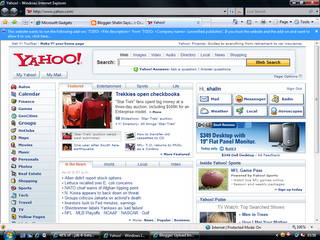
I know this is not very readable, the error message says "This website wants to run the following add-on: 'TODO:
Windows Vista definetely has a lot of eye candy with it's translucent windows, fabulous backgrounds and colors. The designers at Microsoft are awesome. The user experience on the desktop with Microsoft's products is something which is hard to emulate in the immeadiate future on the Linux desktop. Meanwhile on Linux, an entirely new breed of UI technologies are coming up. XGL is striving to put advanced effects on the Linux desktop using the advanced OpenGL platform. You can click and drag your desktop and switch to another workspace while doing a cube rotation effect. Now that's what I call the WOW factor!
Wednesday, October 04, 2006
Googlemail alias for Gmail
For example my email address is shalinmangar [at] gmail [dot] com
So I also have an alias shalinmangar [at] googlemail [dot] com
Try it out!
Friday, September 29, 2006
What's keeping me busy
I've been working on a host of things for Onyomo, many of which you'll be able to see soon on the website. I also attended the Microsoft's X-BOX India launch party on Saturday night. It was very cool, with performances by DJ Aqeel and Euphoria (Euphoria rocks!). Akshay Kumar was there to launch it. We were also shown the X-BOX TV Advertisement. They said that you people are the first ones to see this as it has not been aired on TV yet. It was awesome, O Brother! (catch it on your favorite TV channel soon enough).
Speaking of TV channels, I see a lot of publicity for SkyTV DTH Service here in Delhi. It seems to be catching up quite fast. While I am on these topics, it would be worthwhile to mention that Reliance has launched a Radio channel called BigFM on a frequency 92.7 with plans to make it pan-India soon. After all nothing about Reliance can be small, remember :)
I have also been trying my hand on Software Design competitions at TopCoder. I placed second in a .NET Javascript Drag and Drop component design but unfortunately scored 74.15 points. I needed at least 75 to claim the prize money ($600 for 2nd place). My Hard luck.
Anyways, I'll try to be regular now. Keep checking.
Thursday, September 07, 2006
Voicemail in my GMail inbox
technorati tags:gtalk, voicemail
Blogged with Flock
Saturday, August 26, 2006
Arxiv, Perelman, Poincaré and Mathematics
technorati tags:perelman, poincaré, mathematics, arxiv
Blogged with Flock
Friday, August 25, 2006
OnYoMo featured in BusinessWorld
technorati tags:onyomo, businessworld
Blogged with Flock
Wednesday, August 23, 2006
Javascript on the server
I came across a project on SourceForge.net called jsext. These people are trying to build a pure javascript based server side libraries for common tasks such as connecting to databases and other stuff. These libraries will be able to execute as native server side modules for SpiderMonkey, the Mozilla Javascript interpreter.
The idea behind it is that in most web development projects, javascript is often an integral part on the client end especially these days when Ajax has become quite popular. By making javascript as an option on the server side as well, multiple language development can be cut down and hence maintainability of the software can be increased. Cool!
technorati tags:jsext, javascript, server-side, spidermonkey, sourceforge
Blogged with Flock
Sunday, August 20, 2006
Writely is right again
I first heard about Writely while browsing through the TopCoder forums. Snewman (one of the TopCoder's TopCoder) was the guy working with (owner of?) this company and he was discussing performance optimization problems related to the website. The site has some cool collaboration features such as shared document editing, ability to export as an RSS feed, publishing it to the public or a blog. You can also export the document as a PDF and HTML. Also you can view the revision history of a document and compare between two revisions.
Last night the SRM 316 was my comeback to TopCoder competitions after a long time. I solved the 250 but saw it going down to a challenge as I failed to handle a corner case (once again). Better luck next time.
The article was written in Writely itself. Keep checking :)
Friday, August 18, 2006
Some Google related tidbits
A new version of Google Talk has just been released. It supports Photo & File Sharing, Voicemail and Music status sharing features. Cool isn't it?
Find more information here at the official Google blog and the official google talk blog.
Meanwhile TopCoder has a lot of components related to XMPP posted these days. XMPP stands for eXtensible Messaging and Prescence Protocol. It was developed by the Jabber open source chat server/client and is now used by Google Talk as well as many other IM clients.
The international coding competition Google Code Jam has been announced and registrations have started. Google has been investing a lot of money in these coding competitions. Recently we saw a Google Code Jam for India, China and Europe. TopCoder organizes these competitions on behalf of Google. It's said that the top contestants usually recieve an open offer to join Google's engineering team. All the best to those who are participating. I think I'll be one of them :)
technorati tags:google, code, jam, gcj, google-talk, xmpp, topcoder
Blogged with Flock
Thursday, August 17, 2006
Open source java?
So how does an open source java help? Frankly, I've no idea. "Don't fix it if it ain't broke" is a popular quote. The present status of Java goes well with me. Things are straightforward, there's an implicit standard and besides, Sun has been handling Java development quite well. Multiple forks of the JDK may break compatibility and that's one of the major reasons Sun has been refusing to open source java untill now. And this lack of an open source license for Java is the reason that Sun JDK does not ship with any of the major Linux distributions.
Although some people have had some frustations with their promises. For example, there's no library support for knowing the free disk space on a disk partition in Java. I'd think that's an important thing. Surprisingly this has been a feature request since 9th June, 1997 and after repeated (unfulfilled) promises, it's going to be implemented in the upcoming mustang release of JDK (version 6.0). It shows as fixed in mustang release in the bug logs of Sun.
technorati tags:java, sun, open-source
Blogged with Flock
Wednesday, August 09, 2006
Object oriented event handling in Javascript
I've been playing a lot lately with XMLHttpRequest. As a part of one of my tasks, I set out to build an object oriented javascript component which provided a plug in functionality for a HTML element. Specifically I set out to build a decorator (in design pattern parlance).
I ran into a problem which foxed me for some time until I dig up some old posts in the comp.lang.javascript google group. The problem was something like this:
Suppose you create a javascript custom class which takes a UI element and attaches some event handler to it. That event handler is one of the methods of our class. Now the problem was that I was unable to access any of my class's attributes from that event handler function. Every time I tried using the this object to access a attribute, I was getting an undefined value. After some experimentation I found out that within the event handler function this refers to the UI element on which the event was attached. So inside that event handler, we don't have a handle to the current object of the class.
function MyDecorator(sourceElement) {
this.sourceElement = sourceElement;
this.someOtherAttribute = 192123123;
this.sourceElement.onmouseover = function() {
//do Something with the class's someOtherAttribute.
alert(this.someOtherAttribute); //This does not work
}
}One way out of this problem was a dirty hack. Maintain a global variable to hold the current object. But that can only work when there's only instance of the decorator in the page. The second way was to let the javascript in the page handle the event and pass it on the appropriate decorator object.
But in both of the cases the self-contained nature (or encapsulation) of the object-oriented approach is destroyed. This problem surfaced again when I was writing a javascript class to fetch some data from XMLHttpRequest and process it's response inside the class. In this case you can't implement the second approach outlined above and keeping a global reference to the current object seems the only way to go about it. Or else I can keep aside the object oriented stuff and go about it in a function based approach.
technorati tags:javascript, event-handling, object-oriented
Blogged with Flock
Saturday, July 29, 2006
Updates to previous posts
Just posting some follow ups to my previous posts:
- Got hold of this site from the Ubuntu Forums for help in dual booting Windows Vista and Ubuntu Linux. Seems I am ready for one more try :)
- Krugle has gone live opening up for everybody and not just the beta testers (there goes my exclusivity)
- Although Blue Security has closed it's operations but their unique concept has not gone unnoticed. An open source project called Okopipi intends to initiate anti-spam activities through a distributed system (like BitTorrent). Once again we see the power of the community playing an important role.
technorati tags:ubuntu, vista, dual-boot, krugle, blue-security, okopipi, community, windows, fonts
Blogged with Flock
Sunday, July 23, 2006
My Experiences with Windows Vista
I installed the Beta 2 of Microsoft's Windows Vista on my system a few days ago. Although the visual effects are very very good, but the OS seems to have played havoc on my linux installation. It replaced the GRUB with it's own boot manager (as expected) which showed Vista and the older Windows XP as the two operating systems installed on my system. I should tell you that I run three OS: Windows XP, Ubuntu Linux and Vista.
I found Vista very un-useful for me because of it's pathetic networking subsystem. I was unable to configure my system as the gateway for the other computer on my LAN. I use a cross-cable to connect two computers directly. Apparently, Vista had problems with this and kept giving a error saying something like "Unable to detect router..." But the troubling fact was that for some reasons the download speeds were just not like what they should be. My max download speed is around 11.6KBPS but on Vista the displayed download speeds started at around 11KBPS and waned to something like 60 Bytes (yeah, bytes!) per second making any kind of downloads impossible. Even more alarming was the fact that with a week of using Vista, I was unable to use gmail even once. Now somebody told me it was a known bug (whoa!).
It seems like for Vista, Microsoft has decided to re-write the whole networking stack code, throwing away the years of old but tested code. I've heard that the newer builds of Vista have most of these bugs fixed but it's still buggy enough. And I hate those in-your-face allow/deny security messages that Vista pops up for every action that modifes the system.
Coming back to the bootloader part: Vista replaced GRUB. but the troubling part was that I was unable to boot to my Ubuntu even after I re-installed GRUB by going through the Ubuntu Live CD. At last, enough was enough and I formatted the Vista partition installed a fresh copy of Ubuntu and through the GRUB installed by it finally booted to my old Ubuntu installation (phew!). But now even Windows XP doesn't boot, it keeps giving an error saying "Unable to find autochk.exe". Maybe Vista did something very harsh with the MBR :(
So it's back to the old Ubuntu Linux for me.
technorati tags:grub, windows, vista, ubuntu, bootloader, problems, networking
Blogged with Flock
Tuesday, July 11, 2006
Goobuntu
Well, the latest news indicate that Google has confirmed that they are developing a linux distribution based on (my favorite) Ubuntu Linux. The distribution is said to be named Goobuntu. But at the same time, Mark Shuttleworth (the founder of Canonical and the person behind Ubuntu) has denied this news.
What's not clear at the moment is whether Google is coming into the desktop space through this distro or whether it's merely for internal use and development. We'll just need to wait to find out more about the credibility of this news. Whatever may be the intended use, if Google is indeed developing a distro based on Ubuntu, Ubuntu development will surely gain from this.
technorati tags:ubuntu, goobuntu, google
Blogged with Flock
Sunday, June 18, 2006
The Bird's eye view
Most people go about life in a very routine way, seldom pausing to think differently. In most cases this has to do with the incessant flow of events and our reactions towards them. I feel that our reactions and not the events themselves, determine the course of our lives. Agreed that life is ironic and strange. But equally strange is the fact that with each event, God gave each one of us the power to change ourselves and thus, our lives at any moment of time. We may have little control over the events that were destined by God. But for each such event we get some choices. A choice to fret about this change or to take corrective action or to adapt.
It's always fascinated me that most people are so scared of change. Maybe this is the bane of self-awareness. If you remove this aspect from the equations, life becomes so much easier. For each event, our instinct guides us to a response to be followed without deliberation and the world becomes free of criticism. The conflict still remains though. Since you don't stop to think, you don't try to estimate the outcomes and the fear of change vanishes from the mind. Animals follow this exact procedure. But then, we don't call our human race an intelligent one for nothing. The ability to be aware about our surroundings, to take deliberate action, to ponder upon the reasons for our existence, to acquire knowledge and to apply it to areas which, at first, do not seem logically related, is what intelligence is all about. This definition is by no means complete and may not even be entirely correct. It's just what I feel.
Unfortunately, the need to conform to social standards, to be accepted and appreciated holds back many from accomplishing great things. To break free, you need to see things from a higher level. This is what the bird's eye view is all about. Rising above the crowd and it's noise is no easy task. But it's a task that one must undertake to realise the locked potential in each one of us. I've been trying and I'll continue to try so that one day I may also experience the euphoria that comes along with the higher level. And I believe there's no end to this journey.
I have found that the Bird's eye view is a very effective technique to understand newer aspects and plausible reactions that one could never have seen with the perspective one follows in the normal course. It gives more than just a clear view, it enhances our understanding and thus our ability to think differently. The next time you get stuck, take a moment out of the normal and see things through the Bird's eye view.
Sunday, June 11, 2006
The power of the community
The new poster-boys of today's internet have utilized the power of the community channeling the huge cluster of the internet users themselves to improve the services offered. The whole idea is pretty simple and has been in use since a long time in the hospitality industry. It's called Self-Service. Their are no waiters and the customer services himself. He goes to the ordering counter, places the order, pre-pays the money and then fetches his food from the service counter to his table himself. The cost of the waitors and other such staff are eliminated and this arrangement makes the customer pay more attention to the clean-up. You always place the tray at the designated spot while going out, don't you?
Some clever people applied the same concept with some modifications to the web and Wiki was born. People collaborate online and add, delete, modify, re-organize content to the website. No one person does it, no content writer is hired and the websites evolves instead of being made. Can you imagine what would happen if we apply this model back to our McDonalds? It's akin to McDonalds allowing you to use their tools to make your own burger for yourself and others. Ofcourse one can change the ingredients list and include poison in it. But the underlying idea is that atleast one good samaritan will take notice and change it back to the original copy. The idea says that there are more good people in the world than bad people hence the overall progress will be positive. What Britannica took so many decades to collect and classify, Wikipedia did in a few years. You don't believe me? Check out Wikipedia, Algorithmist and our newest entrant in this field, the MSDN Wiki. By the way, did you know that Wikipedia is one of the Top 100 most popular websites in the world?

As software became complex, new delivery platforms had to be evolved. Suppose you have a product which you give away for free download. It gets slashdotted (or digg'ed) and soon swarms of users come your way and your site goes down. What can you do about that? Buy new servers, take up dedicated hosting, larger bandwidths and scale up. And all that only for the initial excitement about your product. What happens when it dies? You're stuck with your new servers, your expensive hosting plan and all the bandwidth in the world that you'll never need. Enter the community...BitTorrent & Jidgo. The idea...give out torrents for the file that you intend to distribute. The users connect to each other to send and recieve your software and a central tracking server manages these peer-to-peer interactions. Send and recieve is simultaneous to utilize network bandwidth and the protocol is designed to perform better as the number of users interested in the software increases, unlike traditional methods.
Ever seen Rent-A-Coder or e-Lance? They used the community to bring together the people who needed work and the people who wanted some work done. It was successful but the model had an inherent deficiency. It was hard to scale up. It was unsuitable for larger projects as there was no control over the developer and no fixed model of interaction. TopCoder took this further. They developed a model of interaction between the company and the individual. They presented the interaction in the form of a competition to build out the best possible effort from the individual. To attract the best possible talent, they gave away huge amounts of prize money for algorithmic programming contests. So they gave this proposition to the companies needing software...At TopCoder, the individuals from a world-class community compete to design, develop and review software for you. Other revenue streams for TopCoder were sponsorships from companies for their tournaments and employment services.
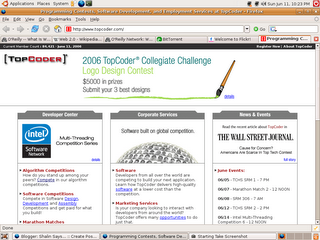
Traditional search methods used algorithms to identify the relevance of documents for certain keywords. They can't be accurate all the time so the ideal would be to employ people to classify the information. But this is limited because the web is too big. Enter Tagging, the community joins hands to tag their favorite websites and the model evolves to include all relevant website. If a hundred people say that this particular site is great for cricket information, then it has to be so. Folksonomy was born. Examples are del.icio.us, ma.gnolia for general purpose searching and Flickr for photos.
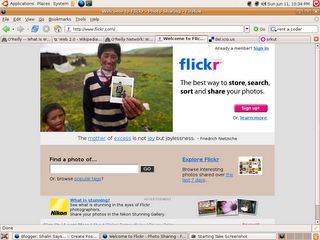


So the conclusion is that for all these websites, the service automatically improves as more and more people use it. Orkut, TopCoder, Bittorrent, Wikipedia wouldn't exist if the community didn't exist. They use the community to harness collective intelligence (Wikipedia, del.icio.us, Flickr, Cloudmark), collective bandwidth (BitTorrent, Jidgo) and collective development (TopCoder, Sourceforge) to grow themselves.
So what will your website do? Does it stay the same way if five people use it or if five thousand people use it everyday? If yes, then it should not. That's the way to survive in the Web 2.0, just think about it.
Sunday, May 28, 2006
Ubuntu Dapper troubles
Warning: The following few paragraphs are meant for techy, nerdy, geeky, FSF breathing, Linux speaking (life is mostly about technology) people.
[begin geek stuff]
The website said that breezy (that's the name of the older version) users can upgrade easily by first making sure that they have updated to the latest "update-manager" utility through Synaptic. Then the only thing you need to do is issue the command:
Now begins the tale. I did what they told me. I applied all the latest security updates that had been pending for a while (around 90+ megs of patches!). Then I issued the required command. Behold! It showed me that a new version of ubuntu is available and a button to upgrade, which I promptly clicked.
The installation process started and it downloaded some files and then a message saying "Cannot upgrade..." popped up. Another one told me "An error occurred while calculating dependencies...". So all this came to halt. Ok, maybe the only way now is to download the ISO and upgrade using that. It took me around 16+ hours to download the ISO. Now without a CD-writer, how am I supposed to install it. I didn't want to wait to get it fixed. So I decided to take a bold step. An experiment to install from the ISO without burning to a CDROM. Reminded me of the good olden days, when all I did was to experiment around with my system...
I mounted the ISO image on my filesystem. Until that time, I didn't know how to do that...for those who still don't, here is the command:
It hanged while trying to upgrade the pcmcia package. A reboot didn't help either. I tried trying to boot from the ISO image from the GRUB prompt. No luck. Then I used the breezy install cd to boot and tried using the bootfrom: parameter. Again no luck. Tried to mount the ISO in between various phases of the breezy install process but that couldn't be done because a lot of clashing was taking place between the differing versions in the breezy install CD and the dapper install ISO image.
Finally, I was left with only one option. I did a default install from the breezy install CD, and then upgraded all packages from within synaptic after adding the ISO into the sources.lst file. That worked somehow and here I am using a brand new ubuntu 6.06 release candidate.

It's pretty cool with the new art-work and a more polished theme. Some menu items have been moved around to my discomfort. For example: the take screenshot menu item has been moved to accessories and the network tools launcher has been moved from the Accessories->System tools menu to the System->Administration menu.
And now I am left with downloading and configuring softwares like Anjuta, Eclipse, Netbeans, Sun JDK (eesh...I almost forgot about it) and ofcourse vlc, mplayer, some totem codecs and Limewire. Interestingly, Synaptic removed Openoffice during the upgrade process. So I'd have to install that too. I also need to download the Linux-image-686 smp kernel. I wonder why ubuntu doesn't ship that with their CDs since almost all modern processors are P4 based and the 686 kernel is for P3 and P4 SMP.
With the dapper release, Sun JDK is going to be a part of the multiverse apt source list. There's a lot of furor in the free software community about Sun's java distribution license. It's surprising that despite the popularity of Java, JDK does not ship with any major Linux distro.
Hmm...If you're not familiar with most of the keywords used above...(even then you actually tried to read it all??)...I'd be happy to put together a starter guide to Linux someday.
Friday, May 26, 2006
Search code, get code
I signed up for the beta program immeadiately after I heard about Krugle through the MoMB (Museum of Modern Betas) about two months ago. So you can imagine the kind of excitement this newbie is generating among the developer community. This new search engine was listed in the hottest 100 betas list at the MoMB. And I think with good reason.
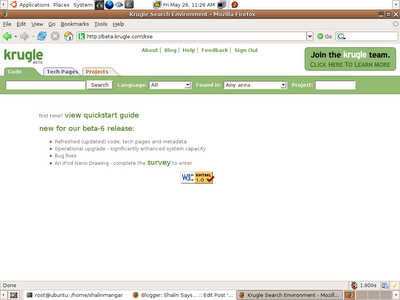
Let me show you around a bit. Krugle crawls and indexes public source code repositories like Sourceforge and the like. It also indexes source codes of many major open source projects such as Apache, Debian, Ubuntu, Fedora, you know what. So you can search for keywords such as Hibernate specifying the code language as Java. You can see the results here:
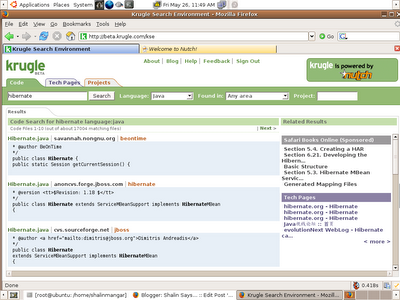
Clicking on any search result, opens it in another tab where you can also see the whole code, the project to which this code belongs and other related sources in that project in a tree view. For browsing anything you never have to go out of krugle.
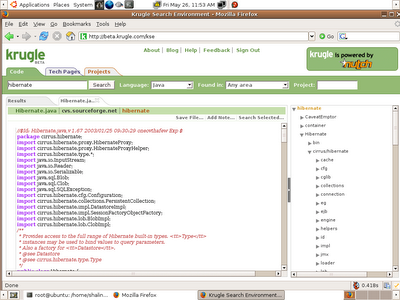
Krugle also searches for Technical content, whenever you search for a particular keyword, it shows you the technical articles relevant to your search term. You can also choose to search only for technical articles or browse source code for an open source project.
Perhaps the most important utility feature that krugle offers is the ability to annotate, bookmark and share your search results. For example, a friend asks you to find file upload code for servlets. You can search for this term, find the most relevant code and technical article, add notes to them and share for him to browse.
Looks good on first sight. I'll post a detailed experience when I...err...get some experience. For now, I have my ERP test coming up in another 2.5 hours. Also, I am downloading the Ubuntu 6.06 "Dapper Drake" Release Candidate which is the almost final release up for beta testing. The final stable release will be up for grabs in June. Another blog posting coming up shortly. Keep watching.
Thursday, May 18, 2006
Anti-Spam dies a death
One such idea died yesterday.
In this story, David wars against Goliath. The Goliath is the bad guy and the David is our hero. Tradition says that good triumphs over evil. Unfortunately for Blue Security Inc, our little David, that didn't happen. What started as an innovative crusade against the multi-million dollar spam business ended in a tragic note. But the idea was, and still is, remarkable.
Tit-for-tat is an old adage. Blue Security Inc. used it with a modern twist. The idea was simple and proved to be effective for a short while.
Spamming is big business. Spam Enterprises flood the inboxes of millions and billions of user's with offers for products and services in the hope that some will eventually buy into those offerings. That some people is big business if you consider that each email user experiences spam and there are billions of email users. Since spam originates from a multitude of nations, policing the internet is not a feasible task. Replying to spam and asking the spammer to stop is a bad option. It just makes the spammer sure that your inbox is a valid and working email address and you can be sure that you'll be flooded even more with offers.
Blue Security Inc. decided to give spammers a taste of their own art. They asked the major spam enterprises to stop spamming Blue's customers. Ofcourse they won't. So when it didn't stop, Blue Security Inc. sent emails from each of their 550,000 strong customer addresses to the spammers asking them to stop. This created such a strong internet traffic that paralyzed the networks of our beloved spammers making sending spam emails an almost impossible task. Some of the spammers put Blue's customers off their mailing list. Sweet Victory!
Blue got venture capital and it's customers were happy, but not for long. The spam brigade united slowly but surely. Utilizing hundreds of thousands of computers, a spam operation allegedly based in Russia sent mass emails to Blue and its customers asking it to stop meddling the spam business. They warned that failing to comply with their request would spark a spam attack so big that none of the customers would be able to do business online.
The counterattack was so large that it affected operations at many other large enterprises. Even the operations of Tucows (Blue's ISP) was crippled for twelve hours.
Yesterday, Blue gave up this fight. They said that they are not prepared to goto war with this Goliath and will shut down operations immediately. The potential damage to their customers is not what they signed up for. They can't start and fight this cyber war. And that makes me very sad. It's sad when someone on the side of good loses the war against evil. Welcome back to the real world.
Meanwhile spam continues to thrive. I got 32 in my gmail spam folder today itself. That brings me to another of my favorite topic Google Inc. and it's awesome products. But more on that later. I have an exam to give tomorrow, but I had to write this one today. Good bye folks until another story grabs my attention.
If you want more of this story, see here and here.
Tuesday, May 16, 2006
Can't believe I am blogging this!
I am comfortable with these subjects, not out of intellectual curosity but because you can get decent enough grades without working too hard. It would be hellish to work hard and get just about decent grades, as many other subjects go. Next change Software Project Management (SPM). Not that I am going to spend too much time on this. I reckon about two hours before the actual test and three more (for the exam, ofcourse).
What's really been going in my mind is a question. Am I starting to make a compromise with my dreams? I wouldn't want to do that, but I am starting to think that I have few choices. But that's not really me, so I guess I'll be back into my old self real soon.
By the way, did I ever tell you about the "Shalin Shekhar Mangar" grand scheme of things? But more on that later. Keep watching :)
To start off
There are three quotes or sayings that are very central to my life: The first one says: "You have an obligation towards life to improve continuously with whatever you have right now". Ok, I'll admit. I find it hard to improve. It's not that I don't like to change. I love change. So here comes the second one: "The only thing constant in life is change". But improving yourself when others are actually enjoying their mediocrity sometimes shakes my faith. Why should I do this? Why should I go on my intellectual pursuits when everybody else around me is just trying to "take it easy" enjoying life?
But then I realize that "around me" is a very narrow boundary. If I extend that to include the whole world I find hundreds (if not thousands) of people going through the same dilemma. People who have seen beyond and who derive pleasure through work. Then again I come back, enlightened with these findings and try to apply them to my own thought processes. So I am getting close to being my favorite Jonathan.
Surprisingly, there's enough content in this post to...err...well post. I don't advice you to check back here if it did not amuse or interest you. And I don't plan to get this blog slashdotted sometime soon. But I do plan to post some half decent technical comments soon. I have a lot of other things that I could rant about. But you won't be interested in reading about them, would you?
PS: In case you're wondering about my third favorite quote, here goes "You see obstacles only when you take your eyes off the goal."
About Me

- Shalin Shekhar Mangar
- Committer on Apache Solr. Principal Software Engineer at AOL.
Labels
- Apache Solr (8)
- Apache Lucene (3)
- Apache Mahout (3)
- AOL (1)
- Architecture (1)
- DataImportHandler (1)
- Faceted Search (1)
- Google App Engine (1)
- Inside Solr (1)
- Machine Learning (1)
- Optimization (1)
- Scalability (1)